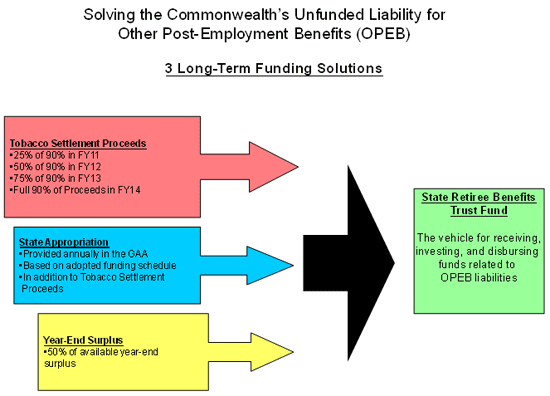

 FY2010 House 1 Budget Recommendation:
FY2010 House 1 Budget Recommendation:
Policy Brief
Deval L. Patrick, Governor
Timothy P. Murray, Lt. Governor
Accounting standards promulgated in 2004 by the Governmental Accounting Standards Board (GASB) required the Commonwealth to begin disclosing its liability for other post-employment benefits (commonly referred to as "OPEB") in its fiscal 2008 financial reports. OPEB costs are currently funded through annual appropriations within state and local government budgets, known as a pay-as-you-go basis. Yet due to rising life expectancies, increasing health care costs and the accompanying rising OPEB liabilities, the pay-as-you-go funding system is unsustainable. In fact, an initial valuation report by an independent actuarial firm of the Commonwealth's liability for these health care and life insurance benefits found that, assuming no pre-funding, the actuarial accrued liability of the Commonwealth for OPEB obligations earned through January 1, 2006 was $13.287 billion. If pre-funding was assumed, the actuarial accrued liability was reduced to $7.562 billion.
The Special Commission to Investigate and Study the Commonwealth's Liability for Paying Retiree Health Care and Other Non-Pension Benefits (OPEB) was established in the fiscal year 2008 GAA to consider the risks and potential solutions related to state retiree unfunded health care and other non-pension benefit liabilities. The Special Commission met during the latter half of 2007 and into early 2008.
The Governor's fiscal year 2010 budget recommendation acts upon many of the key findings of the special commission. The proposals that are included in the Governor's budget reflect many of the commission's recommendations and take proactive steps to address the immense challenge of financing currently unfunded state and local government liabilities for OPEB benefits.
Though Generally Accepted Accounting Principles (GAAP) requires a biennial valuation of OPEB liabilities, the Special Commission recommended that annual actuarial valuations of the liability be carried out by the entity that would manage the funds for OPEB costs.
The commission recommended the establishment a triennial OPEB funding schedule that would be aligned with the Commonwealth's triennial pension funding schedule. Comprehensive pension funding legislation was approved in January 1988 to require the Commonwealth to fund future pension liabilities currently and to amortize the Commonwealth's accumulated unfunded liability. The unfunded liability is required to be amortized to zero by June 30, 2025. Under the current statue, the Secretary of Administration and Finance is required to file the funding schedule with the Legislature. The schedule determines the amount of the pension transfer that will be factored into the annual consensus revenue estimate.
The Governor puts in place a process for adopting a funding schedule for the OPEB unfunded liability and established a deadline for full amortization of the liability by 2038.
The Governor, based upon the Commission's finding, identifies and dedicates the proceeds of three funding sources, tobacco settlement funds, unanticipated budgetary surpluses and annual legislative appropriations to the Commonwealth's unfunded OPEB liability.

The Commonwealth has been receiving tobacco settlement funds annually and distributing them almost entirely to the General Fund. In order to help address the OPEB liability the Governor's fiscal year 2010 budget recommendation phases in contributions of 90% tobacco settlement funds over four years, beginning in fiscal year 2011. For fiscal year 2010 all tobacco settlement proceeds will be deposited into the General Fund and be used for expenditure.
While the fiscal year 2010 budget does not appropriate funds to pay down the unfunded liability (with the exception of year end surpluses discussed in the next section) it does amend Massachusetts General Law to establish a process to determine the amount of funds to be contributed on an annual basis to pre-fund the OPEB liability. The process recommended by the Governor mirrors what is currently used to determine the amount the state dedicates on annual basis to fund its pension liability (noted above). Currently, the only funding being transferred to the State Retiree Benefits Trust Fund are the costs related to funding the current retiree health costs estimated at $394 million for fiscal year 2010.
Consistent with the Special Commission's recommendations, the Governor has proposed using year-end surpluses to help pay for the OPEB liability. The Governor's proposal would dedicate 50% of any surplus Stabilization Fund and 50% to help fund state's OPEB liability.
The Governor recognizes that the OPEB liability is not simply an issue at the state level but is also one that has a significant impact on all of the Commonwealth's cities and towns. The Governor's fiscal year 2010 budget recommendation includes language that would allow local communities an opportunity to invest their funds with the state's healthcare trust fund; thus providing local communities with access to top tier investment managers and a larger pool of assets.
The Governor's fiscal year 2010 budget also establishes a special commission to propose recommendations to ensure the sustainability of retiree health benefits, accounting for employee needs and fiscal impacts.
Prepared by the Executive Office for Administration and Finance · Rooms 373 & 272 · State House
For more information contact:
Rob Dolan (roboert.dolan@state.ma.us)
www.mass.gov/budget/governor